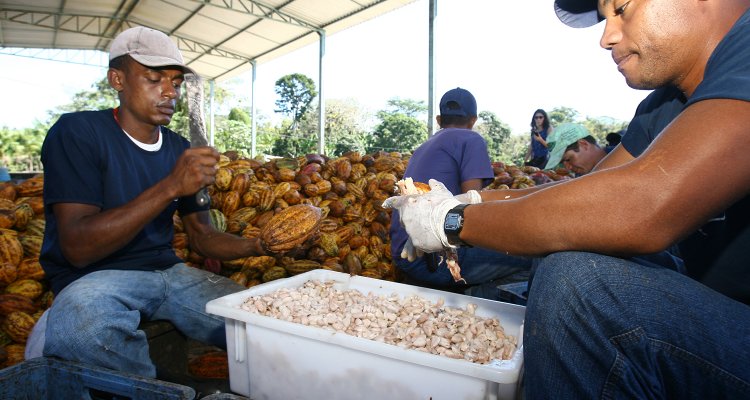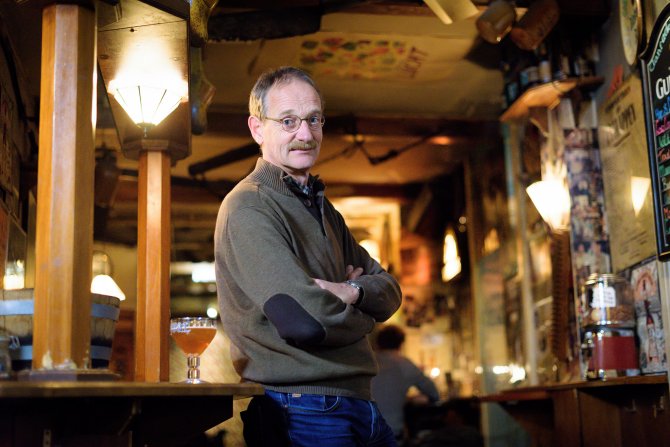
‘Cocoa beans could be processed much more in Ivory Coast and Ghana’
Ken Giller, Professor of Plant Production Systems, has devoted his life’s work to solving the problems of small African farmers. ‘We see poverty among pretty much all farmers in Africa, also coffee or maize farmers. It is the poverty of a growing population that works for 90% in agriculture, on smaller and smaller farms,’ Giller analyses. This is among other things a consequence of the African inheritance structure, in which, in a family of four children, every child would inherit one quarter of the land.
In addition to inadequate agricultural information services, Giller points to the fact that governments invest too little in knowledge and creating infrastructure. ‘There are subsidies and price guarantees for cocoa, but chemical fertiliser, for example, is ten times more expensive in Africa than in Asia, due to lack of subsidies.’

Neoliberalism
He also points to the neoliberal trend in the global food economy as a driver of poverty. ‘Twenty years ago, 16% of the price of a chocolate bar went to the farmers; now, it’s barely 8%. Nearly half ends up in the pockets of traders, chocolate makers, and supermarkets.’
Add to this the fact that cocoa is not easy to cultivate. ‘The lifespan of a cocoa tree is twenty to forty years, so replacement with new varieties is a much slower process than in annual crops. And we only recently found out that potassium is a far more important element in cocoa fertiliser than nitrogen or phosphorus. Research on this topic had pretty much stood still since the 1970s.’ According to agronomic researchers, this is mostly due to the fact that until ten years ago, European cocoa-processing companies primarily focused on maximising the shareholders’ return. ‘This is now slowly changing, under the influence of sustainable investments,’ says Giller.
Opportunities for farmers
And yet, Ken Giller is not pessimistic. There are opportunities for farmers, he says. ‘In Ghana and Ivory Coast, a shift is already taking place towards diversification in cocoa cultivation, and combining farming with agroforestry.’ This involves for example planting cocoa trees among tropical giant trees.
‘The cocoa trees benefit from the shade of the tropical trees. After one season, the leaves falling from the trees provide compost that improves the soil,’ explains Giller. A PhD student is currently studying the possibilities of composting the pod husks of harvested cocoa beans together with tree leaves.
Agroforestry may provide opportunities for combatting climate change, new afforestation in the tropical rainforest, and restoration of biodiversity. ‘I believe that agroforestry combined with cocoa in well-chosen locations can create ecological corridors between nature reserves,’ says Giller. But there are also reservations about this form of agroforestry. For example, while tropical trees help cool down cocoa trees, they also compete with them for scarce water in times of drought.
Bananas
Another option is to plant bananas among young cocoa trees and tropical trees. ‘With their enormous leaves, banana trees provide young cocoa trees with enough shade during their first fragile years. Later on, tropical trees take over the role of shade,’ says Giller. ‘And the bananas provide farmers with an interesting second crop.’
Processing cocoa
Ken Giller does see some improvement. ‘And we could create even more added value by processing the harvested cocoa beans locally.’ Every year, some 750 to 800 thousand tons of cocoa are shipped to the world’s largest cocoa import harbour in Amsterdam, where the cocoa beans are stored and distributed further. This distribution process makes the Netherlands the second-largest cocoa exporter in the world after Ivory Coast, without the Dutch ever producing a single bean. Some of the cocoa is further processed in the Netherlands into cocoa mass, cocoa butter, and cocoa powder. ‘This processing could be done much more locally, in Ivory Coast and Ghana,’ says Giller. ‘Certainly in the context of exporting chocolate to China, this could boost local economic development, which would in turn benefit small cocoa farmers.’